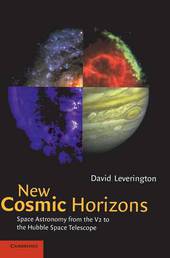
|
New Cosmic Horizons: Space Astronomy from the V2 to the Hubble Space Telescope
Hardback
Main Details
| Title |
New Cosmic Horizons: Space Astronomy from the V2 to the Hubble Space Telescope
|
| Authors and Contributors |
By (author) David Leverington
|
| Physical Properties |
| Format:Hardback | | Pages:520 | | Dimensions(mm): Height 253,Width 181 |
|
| Category/Genre | History of science
Cosmology and the universe
Popular astronomy and space |
|---|
| ISBN/Barcode |
9780521651370
|
| Classifications | Dewey:520.72 |
|---|
| Audience | | General | | Professional & Vocational | |
|---|
| Illustrations |
15 Tables, unspecified; 73 Halftones, unspecified; 53 Line drawings, unspecified; 15 Tables, unspecified; 73 Halftones, unspecified; 53 Line drawings, unspecified
|
|
Publishing Details |
| Publisher |
Cambridge University Press
|
| Imprint |
Cambridge University Press
|
| Publication Date |
1 February 2001 |
| Publication Country |
United Kingdom
|
Description
New Cosmic Horizons tells the extraordinary story of space-based astronomy since the Second World War. Starting with the launch of the V2 rocket in 1946, this book explores the triumphs of space experiments and spacecraft designs and the amazing astronomical results that they have produced. It also examines the fascinating way in which the changing political imperatives of the USA, USSR and Western Europe have modified their space astronomy programmes. This history of astronomy from space is extensively illustrated and unique in its coverage of such a broad range of topics in language accessible to amateur and professional astronomers, and other technically-minded readers. All major astronomy missions of the first fifty years of space research are covered: the Soviet Sputnik and American Explorer projects, the subsequent race to the moon, solar and planetary missions, and the wonders of modern astrophysics culminating in the exciting results of the Hubble Space Telescope.
Author Biography
David Leverington received his degree in Physics from Oxford University in 1963. Six years later he became design manager of a multinational industrial consortium building Geos, Europe's first geosynchronous scientific spacecraft, for the European Space Agency (ESA). In 1977 he joined ESA, Toulouse as programme manager of Meteosat, the meteorological satellite system of the European Space Agency. He was successively head of Spacecraft Engineering and Engineering Director at British Aerospace, Bristol from 1981-89 during which time he was responsible, amongst other things, for the Giotto spacecraft that intercepted Halley's comet, and the Photon Detector Assembly and solar arrays for the Hubble Space Telescope. In 1989 he was made Project Director of the mobile phone system, now called 'Orange', and in 1991 became Deputy Managing Director of British Aerospace Communications.
Reviews'I recommend the book to anyone interested in space astronomy - laypersons, students of astronomy, and professional astronomers.' G. Siegfried Kutter, Nature 'New Cosmic Horizons is a history of how astronomical research has been achieved by space flight, from the first observation of solar X-rays using photographic plates carried on a V2 rocket, to the remarkable Hubble Space Telescope. Easy to read text, supplemented by summary tables (which brought home to me just how many missions failed!), a glossary, appendices and no less than three indexes make this a readily accessible volume which has something for anyone curious about the history or science of astronomy.' Alan Longstaff, Popular Astronomy 'I could easily see this book finding use as an adopted text for an introductory course in a space-science or astronomy-related degree, as it provides a clear and general description of the history of the whole subject ... I would recommend New Cosmic Horizons wholeheartedly ... Everyone who would like an authoritative history of space astronomy should have this book in their collection.' Martin Barstow, The Observatory 'This book by David Leverington provides a much needed and readable account of how space-age astronomy has developed space over the last 50 years ... anyone interested in the broad picture of space-based astronomy will find it a valuable resource.' Neil English, Astronomy Now '... unique in its coverage of such a broad range of topics in language accessible to amateur and professional astronomers ...'. Andreas Verdun, Orion 'I found this book a good read and it brought home the fact that, without the use of spacecraft, we would be limited in what we could hope to understand of our neighbours in the Solar System and beyond.' Astronomy and Space
|